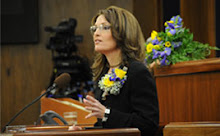
By Shane Vander Hart, Caffeinated Thoughts
Being a governor is a tough job. Mike Huckabee is taking all sorts of heat for his decision to commute the sentence of Maurice Clemmons who shot and killed four police officers in Washington, and was killed today by a Seattle Police officer.
He made a tough decision ten years ago, and it’s going to hurt him politically. I also think it’s easy to point to decisions like these with our 20/20 hindsight and say, “See! See!” We weren’t in his shoes, and we don’t always know the background behind the decisions that were made and the process by which they are made (and they differ state by state).
Governor Huckabee in a statement yesterday, said the following:
I take full responsibility for my actions of nine years ago. I acted on the facts presented to me in 2000. If I could have possibly known what Clemmons would do nine years later, I obviously would have made a different decision. But if the same file was presented to me today, I would have likely made the same decision.
Each state is different, but in Arkansas, a governor doesn’t initiate a parole—the Post Prison Transfer Board does after it conducts a thorough review of an inmate’s file and request. The board then makes a recommendation to the governor, who decides to grant or deny.
If the decision is made to grant any form of clemency (the broad term for a commutation or a full pardon), the governor gives notice of intent and the file is sent to the prosecutor, judge, law enforcement officials, the Attorney General, and the Secretary of State as well as to the news media. A period of 30 days is then started for there to be public input as well as response from the above named officials. At the end of the public response period, the final decision is rendered.
Between 1,000 and 1,200 requests for some form of clemency came to my desk each and every one of the 10 ½ years I was governor. Ninety-two percent of the time, I denied the requests. When I did grant them, it was usually based on the recommendation of at least five of the members of the PPTB, with consideration given to the input from public officials.
Maurice Clemmons was 16 years old when he was charged with burglary and robbery. He was sentenced to a total of 108 years based on the way in which the sentences were stacked. For the crimes he committed and the age at which he committed the crimes, it was dramatically outside the norm for sentencing. The PPTB recommended in 2000 by a 5-0 vote for his sentence to be commuted.
He had served 11 years of his sentence. A pardon would have set him free and cleared his record. A commutation to “time served” would have set him free and released him from any parole reporting. As per the recommendation, I commuted his sentence to the term of 47 years, still a long sentence for the type of crime he had committed, but it would make him parole eligible. It would not parole him, as governors do not have that power in Arkansas. He would have to separately apply for parole and meet the criteria for that.
Despite news reports to the contrary, the only record of public response to the notice to commute was from the trial judge, who recommended the commendation in concert with the board. There were letters of support, but no record of letters of opposition.
Following the commutation, he met the criteria for parole and was paroled to supervision in late 2000. When he violated terms of his parole by participating in additional crimes, he was returned to prison and should have stayed there. For reasons only the prosecutor can explain, charges were not brought forth in a timely way and the prosecutor ended up dropping the charges, allowing him to leave prison and return to supervised parole.
Hindsight is always 20/20, and I believe that Governor Huckabee at the time, with the information that he had available, made a good decision. There are times when governors can and should commute sentences and even offer pardons. They shouldn’t do so without input, feedback and facts and Governor Huckabee didn’t in this case. I fear that by the reaction that cropped up on the right we may be seeing the death of compassion for political gain. That is wrong. Sometimes sentences are not just. Sometimes people do change. What happened in Washington was incredibly tragic, but Governor Huckabee is not to blame. Maurice Clemmons is, and perhaps the Washington judges that allowed him bail with eight felony charges against him.
He may suffer politically, but let’s not paint him as culpable. In defending Governor Huckabee today, Steve Deace of WHO Radio, took a shot at a former Alaska Governor Sarah Palin for a judicial pick that she made earlier this year, as well as, a swipe at former Massachusetts Governor Mitt Romney’s record. In his op/ed at The Iowa Republican today he said:
Predictably, the Republican establishment and its various media cronies who hate Christians more than the Democrats do have pounced on this story.
The exact same people who said nothing while Palin put a Planned Parenthood official on the state supreme court where she could kill babies from the bench with little difficulty, or still haven’t come clean about Romney’s far left record in Massachusetts, now suddenly can’t wait to expose Huckabee’s poor judgment and the tragedy that at least partially resulted from it.
First, I agree with him regarding Mitt Romney. His record in Massachusetts was horrible, and I did not support him 2008 for that very reason. He wanted to run as a conservative, but he governed like a liberal. Then there’s RomneyCare in Massachusetts.
 With Governor Palin, however, like Governor Huckabee, you need to understand the situation in Alaska and Alaskan constitutional law. I covered it pretty extensively at the time it happened, because when I first heard about it… I was disappointed as well. Knowing that she is pro-life I wanted to learn more. You can read the fruit of my homework here. I’ll summarize below:
With Governor Palin, however, like Governor Huckabee, you need to understand the situation in Alaska and Alaskan constitutional law. I covered it pretty extensively at the time it happened, because when I first heard about it… I was disappointed as well. Knowing that she is pro-life I wanted to learn more. You can read the fruit of my homework here. I’ll summarize below:
- Governor Palin did not have the authority to appoint any judge she wanted to, but only those who are recommended to her by the Alaska Judicial Council, which is the constitutional process.
- She took the unprecedented step of asking for everything the Council had on the two finalists that they presented to her.
- Neither candidate was ideal. She couldn’t ask for more candidates, her predecessor, Governor Frank Murkowski tried to do that and failed.
- Governor Palin’s choices were choosing a liberal (the one she didn’t choose) or the independent (which she chose). Also, the person she picked was no longer on the Planned Parenthood board and was off of it long before Planned Parenthood offered abortions in Alaska. She also didn’t list it on the application given to Governor Palin or on a 2001 application with then Governor Tony Knowles (who is a liberal Democrat). Maybe she didn’t want to appear to be taking sides on the issue?
- Tom Minnery of the Alaska Family Council admitted the problem is the process, not Palin. Bob Flint, an Anchorage attorney (who is pro-life) said that nothing short of a Constitutional amendment will fix it.
I left a comment on Deace’s post, and he responded via Facebook (and my reply). He said she should have fought it, and that she violated God’s law. I think she didn’t want to abdicate her role as Governor and also had other issues to consider. Instead of smearing Palin and Governors in positions like these (Matt Blunt faced a similar circumstance in Missouri) we should work to change laws that box Governors in.
Oh and Steve, when has the establishment ever protected Governor Palin?
Shane Vander Hart is the editor of Caffeinated Thoughts. He loves to connect with fellow Palin supporters so feel free to follow him on Twitter or friend him on Facebook.

































No comments:
Post a Comment